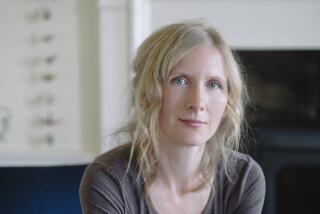‘Earthbound Thinking’ About Space Shuttle
Congratulations to Matthew Burbott and Allen Klinger (Letters, Feb. 4) for the only down-to-earth views regarding the shuttle tragedy. Burbott wrote of the “romanticized perceptions”--and Klinger of how we have made of the shuttle a “golden calf.”
Most of the views of other writers consisted of idealistic rhetoric about dreams and pioneering, of sacrifice and heroism. I say the shuttle program is not worth the loss of a single human life.
James Brunet writes, “We can say ‘no’ to the unknown mysteries of space, turn our backs, and announce our decline as a civilization.” This is patently absurd. Our decline as a civilization has no possible connection with what we do in “space”--but has everything to do with what we do on this planet--and why and how we do it, all of it crying for immediate attention.
Despite the hype of the media and the biased views of space experts we have no real need for such flights. There can be no benefits from “out there” that will substantially improve our lot “down here.”
Rather than all the high-powered hyping of outer-space exploration, the media should inform the public that billions of their dollars are being spent to satisfy the curiosity of scientists, several of whom have stated that if they can discover other life in the cosmos, they can prove that a Creator-God had nothing to do with life on our planet. And we are paying the enormous cost of this noble objective. Actually, each discovery has generated far more questions than providing answers.
The late nuclear physicist, Leo Szilard, said of the moon trips, “They are lunacy; not science, but circus.”
Can’t we see that the needs and sufferings of millions here on earth are tied to a time-bomb whose fuse grows shorter by the minute?
It’s clear that most citizens do not want to acknowledge such facts. Most of the highly educated and experienced scientists should be taken off the space probes and challenged to solve the most critical earth problems in order to make life more tolerable, more just, even possible, for vast numbers that are suffering and perishing.
HADDON MacDAVID
San Diego
More to Read
Sign up for Essential California
The most important California stories and recommendations in your inbox every morning.
You may occasionally receive promotional content from the Los Angeles Times.










